‘The OA’s Ian Alexander Is The Future Of Trans Visibility In Hollywood
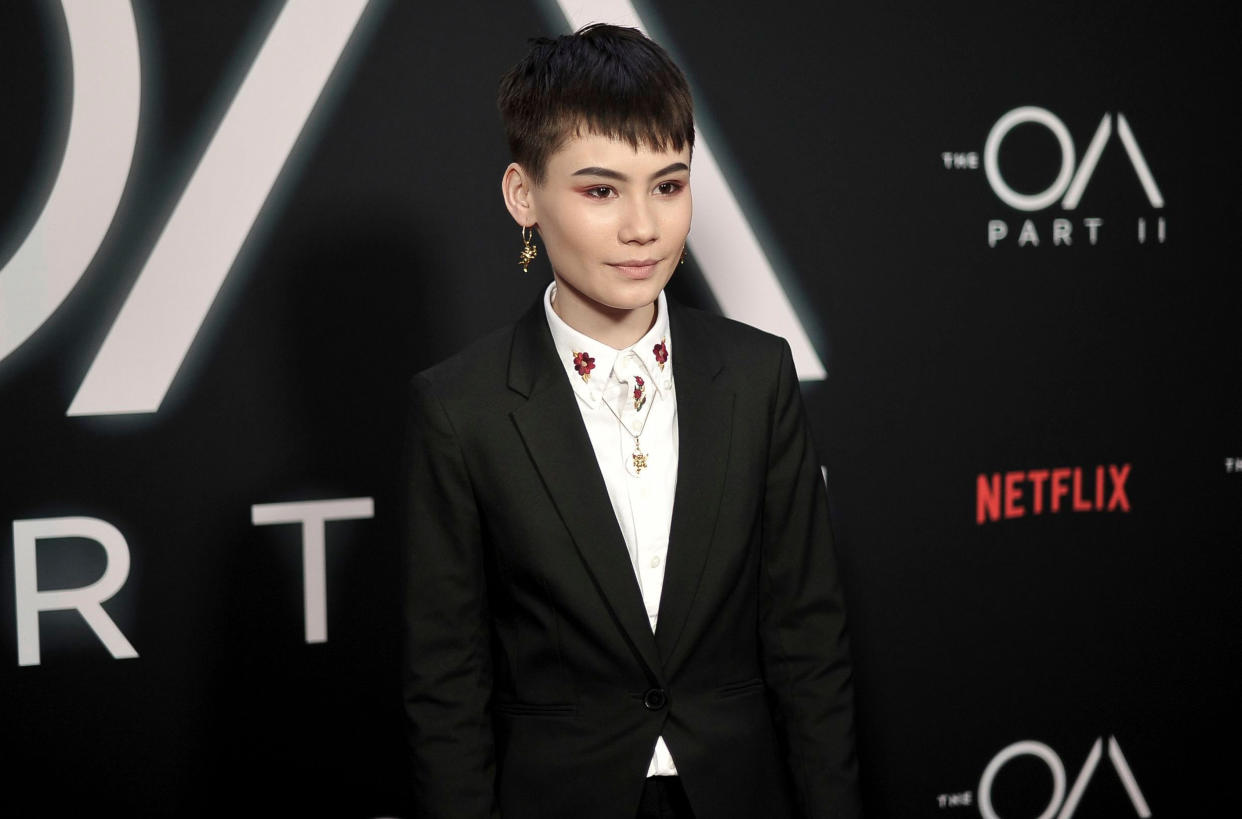
The interdimensional sci-fi Netflix series The OA from Brit Marling and Zal Batmanglij is, like many of their projects, unapologetic when it comes to having a complex narrative that would make your brain bleed. After the first season set up this wild world, the second season, which launched on the streaming giant on March 22, is a little more straight forward, but the series continues with its layered storytelling and, at one point, puts a trans character in its spotlight — and he is played by trans actor Ian Alexander. At 17 years old, Alexander identifies as trans and his place in the series is a quiet, yet groundbreaking feat when it comes to contributing to authentic casting and storytelling in television.

Brit Marling in ‘The OA’
Related stories
Ricky Gervais' Dark Comedy 'After Life' Returns For Second Season On Netflix
In The OA, Marling plays Prairie Johnson, a woman who mysteriously returns after missing for seven years. Once blind, she now can see, has also has scars on her back and now goes by the moniker The OA. The FBI and adoptive parents try to get her to share her story about where she has been, but she refuses. Instead, she befriends four high school boys and a teacher and spills the tea about where she has been. As a result, she asks for their help to help rescue others via opening a different dimension. One of the five is Alexander’s Buck, a character that was very specific when it came to casting.
When Alexander sat down and talked with Deadline, he said that Marling and Batmanglij specifically wrote the role of Buck for a 14 to 15-year-old Asian American transgender male. When they told casting, they laughed it off and said that they probably will only get one person to fulfill the role because of the specific description. “They put out and open casting call on the internet and miraculously found me through that and I think there was something like 400 responses,” said Alexander. “So, there is no excuse for Hollywood to be like, ‘Oh, there’s no trans male actors,’ or whatever. It’s possible.'”
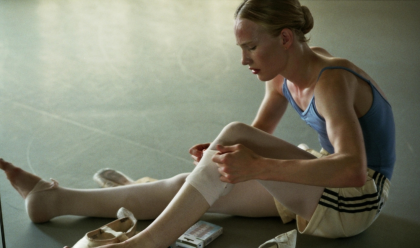
Victor Polster in ‘Girl’
As the landscape of the industry changes, Hollywood still can’t escape its history of casting cisgender actors in trans roles: Hilary Swank in Boys Don’t Cry, Felicity Huffman in Transamerica, John Lithgow in The World According to Garp, Jared Leto in Dallas Buyers Club and Victor Polster in Girl. This has since become a topic of heated discussion and backlash. The tide seemed to change with the casting and subsequent exit of Scarlett Johansson from Rub and Tug. The actress stepped down from the project after she received backlash for being cast in the film which followed trans man Dante “Tex” Gill.
However, TV has been ahead of films when it comes to authenticity with trans actors in trans roles. Actresses like Laverne Cox and Trace Lysette have broken ground in Orange is the New Black and Transparent while Mj Rodriguez, Dominique Jackson, Indya Moore, Hailie Sahar and Angelica Ross made history in Pose which has the largest trans cast in the history of television. Nicole Maines also made history as the first trans superhero on the CW’s Supergirl.
Alexander joins this list of names which further dispels myths of representation of LGBTQ people and other marginalized communities — specifically trans actors. He felt that the role in The OA was so specific to him. Initially, he thought that there was not going to be any other opportunities like this, but as change slowly creeps into the industry, it isn’t necessarily the case.
“I was just so blown away and, yeah, Zal and Brit really took that leap of faith and they trusted the world to take care of it and to find someone who was right for the role and I’m so glad that they did and that they didn’t cave into trying to find a cis actor,” said Alexander.
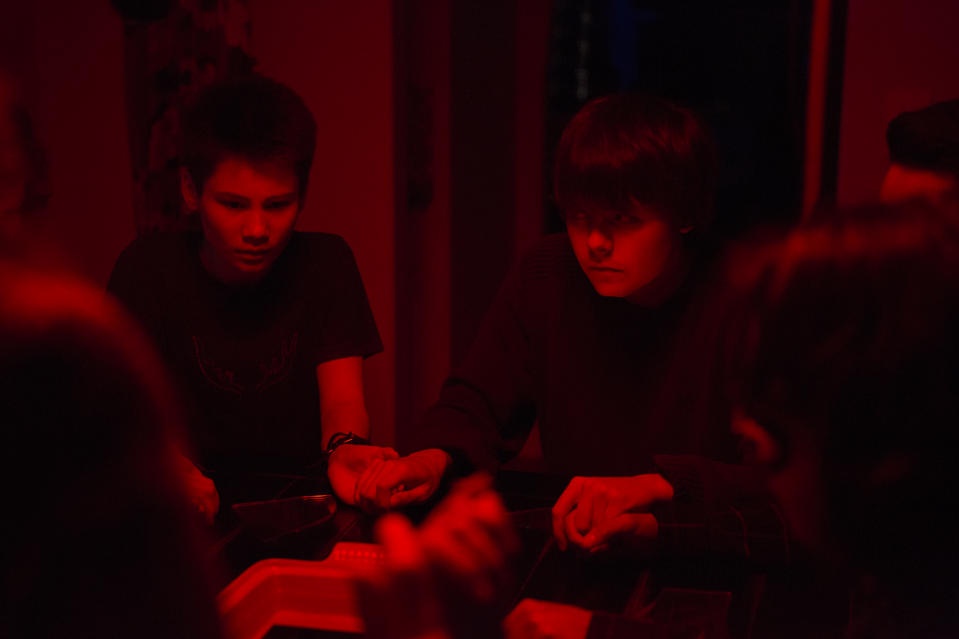
Alexander (left) with Brendan Meyer in ‘The OA’
The OA marks Alexander’s first major television role and admits he was afraid that he would be the token trans person in the role, but the script was so “beautifully written and well done” that it avoided that. “They acknowledge the fact that he’s trans, but that’s not the core of his identity as a character,” he said. “His involvement in the story has nothing to do with him being trans, he’s just another teenager who happens to be trans, and I think that was so important for authentic representation in the show and definitely never felt like I was being tokenized.”
Because of the specificity of his role in The OA, Alexander was scared that he wouldn’t get any jobs beyond Buck. “There really aren’t that many opportunities for trans-masculine actors and definitely at first I was like, ‘There’s nothing’,” he said. “I can’t go out for male roles because I’m not on testosterone — I don’t necessarily pass a male yet. So, casting directors would look at me and just be like, ‘no’.” Luckily his doubt was immediately shut down when he booked a role on the video game The Last of Us, the feature film Every Day and continues to go to auditions — all because of his role on The OA.
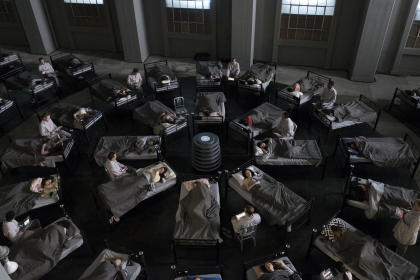
A scene from the second season of ‘The OA’
“I go into the audition room and I sit down and see other trans people and it’s just such an incredible feeling to not walk into a room and feel alienated,” he said. “I feel comforted to know that there are other trans actors like me and that I actually have competition. There are so many people who are willing to go out for these roles and I think that’s incredible.”
Alexander comes from a layered cultural background. His mother lost her parents and immigrated here from Vietnam with her little brother. After staying with extended family, his mother lived the epitome of the American dream, becoming valedictorian, getting a college degree and having a family.
In addition to being the son of an immigrant, he is also biracial and was raised Mormon. With a Vietnamese mother, white father (who speaks pitch-perfect Vietnamese, by the way) and being raised in what many people see as a conservative religion, Alexander’s questions about his own sexuality and gender identity started to surface when he was 11 years old. “I felt so guilty about these feelings that I was having and it took me a long time to really accept myself because of that because I was really repressing it,” he said. Alexander thought his feelings were “sinful” and “bad” and thought the best way to deal with it was to talk to God about his problems. In other words, “pray the gay away.”
“Honestly, it didn’t work,” said Alexander. He realized that his culture and religious upbringing shaped who he was and made it difficult to accept the fact that he was trans. “Once I accepted it for myself then there was fear of how are my family was going to react,” he said. “It didn’t go very well.”
He continued, “Obviously, it’s very hard for them to accept because they just couldn’t understand and conceptualize what it meant to be transgender. They believed, very strongly, that this was something that was wrong and needed to be corrected.”
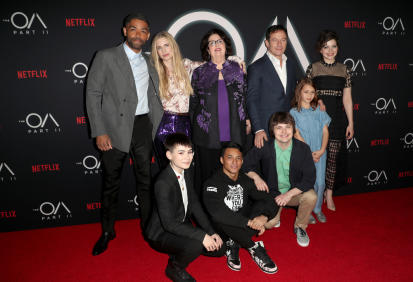
The cast of ‘The OA’:
Kingsley Ben-Adir, Bria Vinaite, Phyllis Smith, Jason Isaacs, Chloe Levine, Ian Alexander, Brandon Perea, Brendan Meyer, and Zoey Todorovsky
In addition to their struggle with accepting Alexander’s gender identity, they were also skeptical about his goals of becoming an actor — something they thought was just a child-like dream. He was determined to prove himself as not only as a trans man but also an actor. It wasn’t until he auditioned for The OA that his family realized that made them realize his real identity and his potential as an actor. Even on set when filming The OA, his mother followed the cast and crew’s lead in using Alexander’s correct pronouns. Even so, Alexander said that as soon as they went home, his mom when back to misgendering him. Despite that, this was a revelation.
“It just sort of made me realize ‘Oh my god, I can be in an environment where people accept me fully as who I am’ and that just gave me a lot of hope and also made me really want to go into acting for my career,” he said. “I was straight the bat accepted and welcomed into this chosen family…I was really thankful.”
The struggle has been real for Alexander and he continues to hit speed bumps along the way, but he is very zen and has learned to overcome obstacles along the way. He admits that he has matured very quickly because of all the conflict. “I think, this is gonna sound cheesy, but I think The OA genuinely saved my life because I was in a very, very dark place before it and I just really had this limited view of the world, like, ‘This is my life, everyone is denying my gender’ and I didn’t see that there was a world outside of that where people could accept me for who I was.”
“I struggled with really severe depression and anxiety and I still do, but it’s very well managed now and, obviously, therapy helps,” he admits. “Also, being in an environment where people just fully accept my gender has helped my mental health so much. Since moving to LA, I feel like I’ve just had so much clarity and so much peace with who I am, which means I can dress however I want, I can present however I want because no one’s gonna question my identity and the validity of that.”
Part of this season of The OA has a focus on Alexander’s character Buck and another character named Michelle Vu from a different dimension, who Alexander also plays. “The character is so mysterious and kind of elusive throughout the whole season — you don’t really know much about Michelle,” explains Alexander. “They don’t have any straightforward answer of what Michelle identifies as, but my personal interpretation is that Buck is trans across all dimensions — but maybe in some of them he hasn’t realized it yet, or hasn’t socially transitioned yet. That was just my personal interpretation that Michelle doesn’t realize and just hasn’t socially transitioned yet.”
The story arc for Buck and Michelle hit close to home for the actor at two particular times in his life. Alexander points out that “every trans person has a past self and it kind of feels like that past self dies when you transition”. “In a way, to put on that wig and to put on that costume, it felt like I was reliving my pre-transition days and it just felt natural to me,” he admitted. “I wasn’t uncomfortable, I wasn’t dysphoric, it just felt, I was like, ‘Oh, okay this is who I was four of five years ago’. I felt like Michelle was a past self — kind of like a memory of Buck.”
Sci-fi tends to be genres that speak to marginalized communities. In its own special way, sci-fi narratives, although grand and fantastical in spectacle, speak to marginalized communities. As a Mormon-raised half-Vietnamese, half-white trans man, Alexander says that the sci-fi genre ties in well with the perspectives of marginalized communities — which is very different from cisgender white hetero people. Those motivations and viewpoints lend well to sci-fi — especially The OA, where the characters travel across different dimensions where they encounter different versions of themselves.
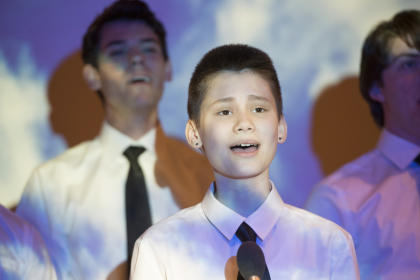
Alexander in Season 1 of ‘The OA’
“I feel like a lot of queer people can identify with that and a lot of non-white people can identify with that as well,” he explains. “To just have different identities and different selves — it just kind of has to do with our view of the world and how it’s very expanded and not limited to one identity or one ideology.”
Alexander appreciates the various perspectives of the world when it comes to storytelling, but there is a privileged perspective that comes with being cisgender, heterosexual, male and white. “They’ve never had to deal with discrimination against their race or gender.”
He adds, “A lot of people of color and minorities have different political perspectives and tend to be better at acknowledging multiple sides to things than someone who has a very limited perspective on the world.”
Alexander auditioned for the role of Buck when he was 14 and now at 17, he is becoming a voice of advocacy for the LGBTQ community. That said, he has been told on more than one occasion that he is wise beyond his years even before his journey of discovering his gender and sexual identity. “I’ve just always been quiet and reserved and intellectual,” he said. “I really exceeded in school and so, I think people are quick to dismiss that because of my age, but then they start talking to me and they realize that I’m actually not just some ditzy teenager.”
The OA continues to champion inclusion and proves that authentic casting and representation is and has always been possible in Hollywood — people just have to ask and they will receive. Not only that, The OA has proven to be deeply personal, helping him celebrate and embrace his own identity and in, turn, making the trans community visible.
“Because whether or not I present hyper-masculine or not, at the end of the day, I’m still Ian, I still feel masculine, I still feel like I only want to use he him pronouns and nothing changes that,” he said.
Sign up for Deadline's Newsletter. For the latest news, follow us on Facebook, Twitter, and Instagram.

